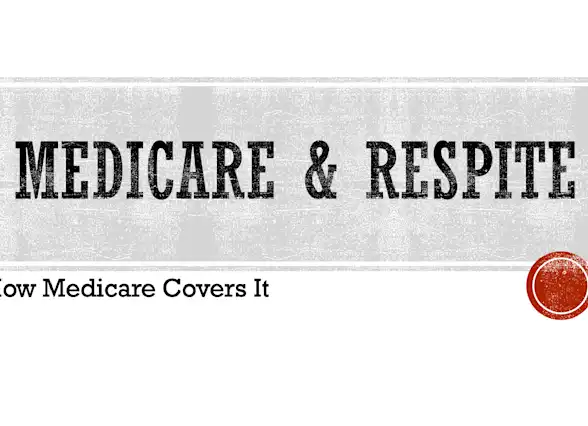Respite, According to Medicare
Medicare has its own specific definition of "respite care" and very structured guidelines for its use and coverage.
Get insurance benefits, legal documents, and medical records in one place

Helpful Highlights
Medicare provides coverage for episodes of up to 5 days of respite care under the Medicare Part A hospice benefit.
Medicare only covers respite care for caregivers of beneficiaries receiving hospice services.
Although hospice care is delivered at home, Medicare does not cover respite care in the home.
Documented justification for respite care is required and not all caregivers qualify for relief.
Definition
Respite by definition is a rest period. Respite care is simply and broadly defined as short-term relief for caregivers.
Medicare more specifically defines respite care as, "Short-term inpatient care provided to the individual only when necessary to relieve the family members or the person caring for the individual at home."
Does Medicare pay for respite care?
The answer is no unless your loved one is receiving hospice.
Persons at the end of life and receiving hospice are eligible for respite care under the Medicare Part A hospice benefit. This allows the primary caregiver to get a break of up to five consecutive days and nights while the patient is cared for in a Medicare-certified inpatient facility.
These facilities are often nursing homes, but hospice providers have arrangements with many 24-hour long-term care facilities that can also provide respite care. Some hospices provide their own inpatient hospice units for occasional respite care. Medicare does not cover respite care in the home.
It's important to understand that the respite care portion of the hospice benefit is not available to just anyone at any time. Qualifications apply and justification for the relief must be documented. In other words, the caregiver must demonstrate a need for respite care. Examples are:
Physical or emotional exhaustion from providing round-the-clock care
Away overnight for an important family event (funeral, graduation, wedding, etc.)
Personal illness
More than one respite period (of up to 5 days) is allowable in a single billing period, provided there is justification; however, be aware that frequent use of respite care is a red flag to Medicare.
The hospice benefit has other provisions
If you think about "respite care" as any time the caregiver can get a break from caregiving responsibilities, then the hospice benefit does provide some options. Respite is just one of four levels of care within the hospice benefit. The other levels are:
Routine home care. This is how hospice care is most often provided, with hospice aide and homemaker services covered.
Continuous home care. Hospice staff work in shifts up to 24 hours per day to manage acute symptoms and avoid hospitalization. Once stabilized, continuous care ceases.
Inpatient care. For those whose needs cannot be managed at home, they can receive short-term inpatient hospice care until they can return home.
If Medicare doesn't pay for respite care, who does?
Although not every plan, program, and service listed here may completely cover the cost of respite care, those who don't can still offload part of the cost.
Qualifications may apply and not all programs and services are available in every state or through every insurance plan.
For more details on these payor sources, see our Guide: Sources for Respite Care Coverage.
Medicare Advantage (MA) plans (Part C)
Adult daycare, in-home (not institutional) hospice respite, short-term residential
Medicaid
Not a standard benefit, but available via waivers or state plans
U.S. Department of Veterans Affairs (VA)
Various benefits and programs are available, though not all are eligible
National Family Caregiver Support Program
State Family Caregiver Support or Respite Programs (not available in every state)
Lifespan Respite Care Programs (not available in every state)
Private funding sources
Faith-based organizations
RESOURCES
Medicare.gov - Medicare Hospice Benefits
National Hospice and Palliative Care Organization (NHPCO). (2021, July). Compliance tools and resources: Respite tip sheet. Link
No content in this app, regardless of date, should ever be used as a substitute for direct medical advice from your doctor or other qualified clinician.
Likewise, no content in this app, regardless of date, should ever be used as a substitute for direct advice from a licensed insurance broker or other qualified plan-payer professional.
Get more support and guidance on insurance benefits, medical records and legal forms.
Helpful brings together your insurance benefits, legal documents, and medical records in one personalized place — so you always know what you have, and never have to search again.

Technology for Health Tasks. Mental Health for the Tough Stuff.
Helpful connects your medical records, insurance, and caregiving tasks automatically. And when you need more than logistics, a therapist is here to guide you.
In-Network and Covered
For Individuals, Couples and Families
HIPAA Compliant, Data Stays Private


Healthcare Tasks Simplified

From syncing records to spotting drug interactions, Helpful does the heavy lifting, turning complex health info into clear tasks and showing you benefits you can actually use, giving you clarity and control over your care.

In-Network Mental Health

Our licensed therapists are here to support you and your loved ones through stress, burnout, and life’s hardest moments, with an inclusive, compassionate approach that works with most insurance plans.

Create Legal Documents

Plan ahead by creating will, trusts, advance directives and more, that ensure your wishes are honored in the event you can’t speak for yourself -with Helpful guiding you every step of the way.